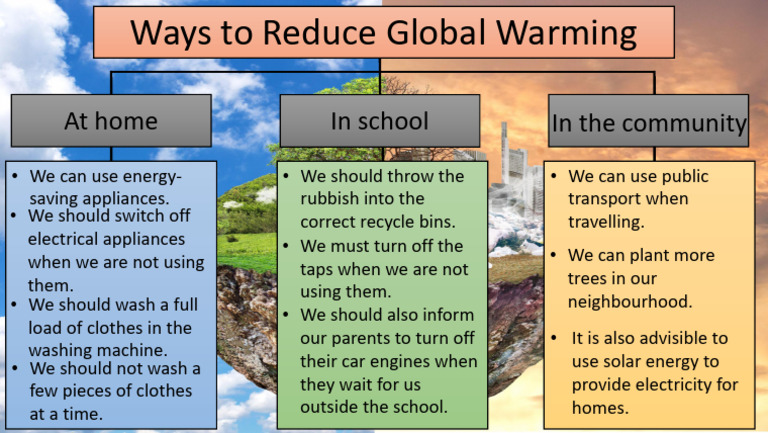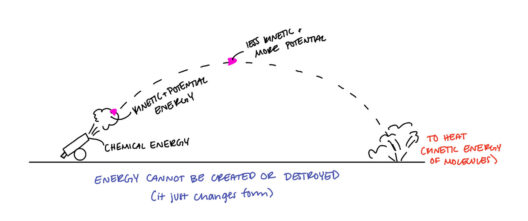Global warming is not merely an abstract concept; it is an urgent reality that requires immediate action from each of us. The rising temperatures, melting ice caps, and erratic weather events signal the dire state of our planet. Combatting global warming necessitates a collective approach, yet individual actions play a pivotal role. Understanding how each one of us can contribute to this monumental effort can profoundly shift perspectives and inspire curiosity about meaningful interventions. Here are some simple yet impactful ways to make a difference.
1. Educate Yourself and Others
First and foremost, knowledge is a powerful tool. By deepening your understanding of climate change, you can disseminate information among your peers and community. Engage with factual resources, documentaries, and articles regarding the science behind global warming. Host discussions or initiate book clubs focused on climate literature. The more informed people become, the more passionate they will be about implementing sustainable practices.
2. Reduce Energy Consumption
Energy consumption in homes and businesses contributes significantly to greenhouse gas emissions. A conscious effort to reduce this consumption can yield considerable benefits. Start small by turning off lights and unplugging devices when not in use. Consider investing in energy-efficient appliances and LED lighting. An even greater impact can be achieved by upgrading to renewable energy sources, such as solar power. Not only do these measures conserve energy, but they also lower utility bills over time.
3. Opt for Sustainable Transportation
Transportation is a leading contributor to global warming. By reevaluating your commuting habits, you can make substantial changes. Whenever possible, choose walking, biking, carpooling, or using public transportation over driving solo. Not only does this reduce carbon emissions, but it fosters community engagement. If feasible, consider purchasing an electric or hybrid vehicle, which can substantially lower your carbon footprint.
4. Embrace a Plant-Based Diet
What we consume has a monumental effect on the environment. The livestock industry generates significant greenhouse gas emissions, alongside deforestation and biodiversity loss. By incorporating more plant-based meals into your diet, you can mitigate these effects. You don’t have to eliminate meat entirely; simply aim to have one meatless day a week, gradually working up from there. Experiment with new recipes; you may discover culinary delights that you wouldn’t have encountered otherwise.
5. Support Local and Sustainable Products
When you purchase locally grown foods and products, you significantly reduce the carbon emissions associated with transportation. Farmers’ markets are an excellent source for fresh, organic produce that supports local economies. In addition, selecting sustainable brands that prioritize eco-friendly practices can help shift the market towards greener alternatives. Seek products with minimal packaging, as this reduction inhibits excessive waste generation.
6. Reduce, Reuse, Recycle
The three Rs—Reduce, Reuse, and Recycle—serve as a crucial mantra for environmental stewardship. Begin with reduction: consider your purchasing habits and determine what items you genuinely need. Next, get creative with reusing. Obsolete items can often serve new purposes; for instance, glass jars can become storage containers. Finally, prioritize recycling. Familiarize yourself with local recycling guidelines and ensure you’re disposing of materials properly. Every piece of recycling ultimately diverts waste from landfills.
7. Conserve Water
Water conservation might seem tangential to climate change, yet it is intrinsic to combatting this challenge. Water treatment processes require energy, and excessive water usage often leads to increased energy expenditure. Simple actions like fixing leaks, taking shorter showers, and using water-saving fixtures can significantly reduce water consumption. Moreover, watering gardens during the cooler parts of the day can minimize evaporation loss.
8. Advocate and Participate in Policy Change
Your civic engagement is crucial in the larger fight against climate change. Familiarize yourself with local and national policies regarding environmental protection. Advocate for measures that reduce carbon emissions and promote sustainable practices. Attend town hall meetings, join environmental organizations, or even engage with your representatives to express support for climate-friendly legislation. Creating pressure for systemic change amplifies individual efforts exponentially.
9. Cultivate Green Spaces
Urbanization and deforestation have dramatically diminished green spaces, which are essential for carbon absorption. Consider planting trees or starting a community garden. Not only does this act bolster biodiversity and enhance aesthetic value, but it also fosters a sense of community and well-being. Engaging with nature can remind us of our interconnectedness with the environment.
10. Join or Support Environmental Organizations
Collaboration can amplify the impact of individual efforts. Become an active member of environmental organizations that align with your values. These groups can provide resources, networking opportunities, and ways to participate in larger campaigns. Additionally, consider donating to charities focused on combating global warming. Each contribution propels further research and advocacy efforts toward sustainability.
In conclusion, the threat of global warming may seem daunting, but each of us possesses the power to effect meaningful change. A shift in perspective—recognizing that every action counts—can ignite curiosity and inspire others to join in the monumental task of safeguarding our planet. By committing to small, sustainable practices and advocating for broader policy changes, we can collectively combat global warming and create a harmonious environment for future generations. The time to act is now.








